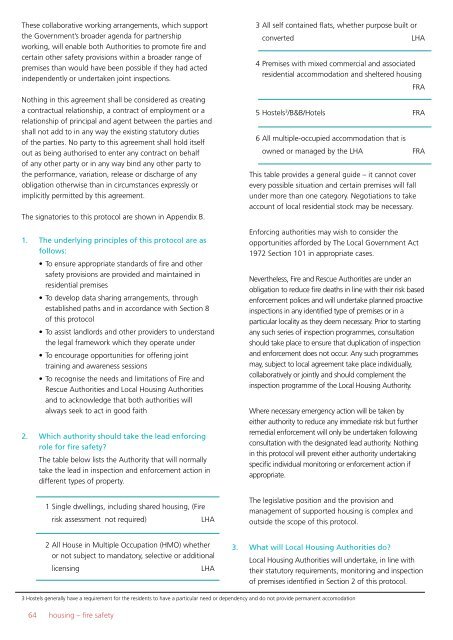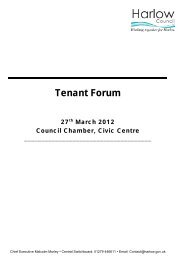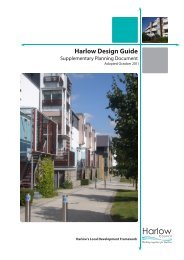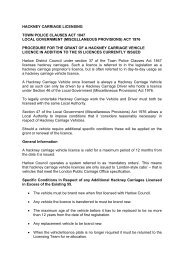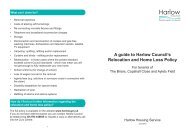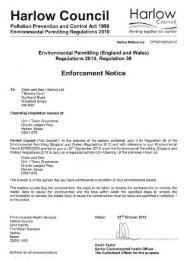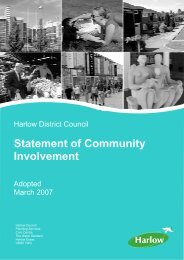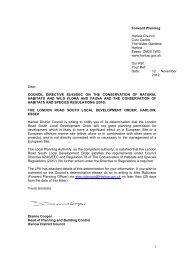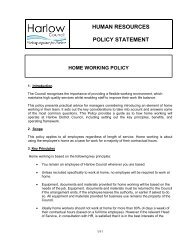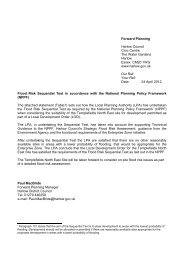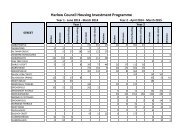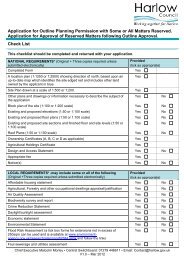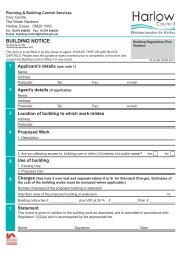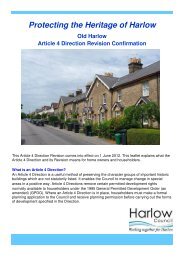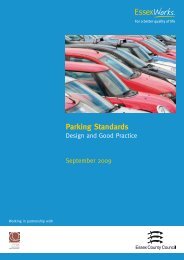HMO fire safety guidance - Harlow Council
HMO fire safety guidance - Harlow Council
HMO fire safety guidance - Harlow Council
You also want an ePaper? Increase the reach of your titles
YUMPU automatically turns print PDFs into web optimized ePapers that Google loves.
These collaborative working arrangements, which support<br />
the Government’s broader agenda for partnership<br />
working, will enable both Authorities to promote <strong>fire</strong> and<br />
certain other <strong>safety</strong> provisions within a broader range of<br />
premises than would have been possible if they had acted<br />
independently or undertaken joint inspections.<br />
Nothing in this agreement shall be considered as creating<br />
a contractual relationship, a contract of employment or a<br />
relationship of principal and agent between the parties and<br />
shall not add to in any way the existing statutory duties<br />
of the parties. No party to this agreement shall hold itself<br />
out as being authorised to enter any contract on behalf<br />
of any other party or in any way bind any other party to<br />
the performance, variation, release or discharge of any<br />
obligation otherwise than in circumstances expressly or<br />
implicitly permitted by this agreement.<br />
The signatories to this protocol are shown in Appendix B.<br />
1. The underlying principles of this protocol are as<br />
follows:<br />
• To ensure appropriate standards of <strong>fire</strong> and other<br />
<strong>safety</strong> provisions are provided and maintained in<br />
residential premises<br />
• To develop data sharing arrangements, through<br />
established paths and in accordance with Section 8<br />
of this protocol<br />
• To assist landlords and other providers to understand<br />
the legal framework which they operate under<br />
• To encourage opportunities for offering joint<br />
training and awareness sessions<br />
• To recognise the needs and limitations of Fire and<br />
Rescue Authorities and Local Housing Authorities<br />
and to acknowledge that both authorities will<br />
always seek to act in good faith<br />
2. Which authority should take the lead enforcing<br />
role for <strong>fire</strong> <strong>safety</strong>?<br />
The table below lists the Authority that will normally<br />
take the lead in inspection and enforcement action in<br />
different types of property.<br />
1 Single dwellings, including shared housing, (Fire<br />
risk assessment not required)<br />
LHA<br />
3 All self contained flats, whether purpose built or<br />
converted<br />
LHA<br />
4 Premises with mixed commercial and associated<br />
residential accommodation and sheltered housing<br />
FRA<br />
5 Hostels 3 /B&B/Hotels FRA<br />
6 All multiple-occupied accommodation that is<br />
owned or managed by the LHA<br />
This table provides a general guide – it cannot cover<br />
every possible situation and certain premises will fall<br />
under more than one category. Negotiations to take<br />
account of local residential stock may be necessary.<br />
Enforcing authorities may wish to consider the<br />
opportunities afforded by The Local Government Act<br />
1972 Section 101 in appropriate cases.<br />
FRA<br />
Nevertheless, Fire and Rescue Authorities are under an<br />
obligation to reduce <strong>fire</strong> deaths in line with their risk based<br />
enforcement polices and will undertake planned proactive<br />
inspections in any identified type of premises or in a<br />
particular locality as they deem necessary. Prior to starting<br />
any such series of inspection programmes, consultation<br />
should take place to ensure that duplication of inspection<br />
and enforcement does not occur. Any such programmes<br />
may, subject to local agreement take place individually,<br />
collaboratively or jointly and should complement the<br />
inspection programme of the Local Housing Authority.<br />
Where necessary emergency action will be taken by<br />
either authority to reduce any immediate risk but further<br />
remedial enforcement will only be undertaken following<br />
consultation with the designated lead authority. Nothing<br />
in this protocol will prevent either authority undertaking<br />
specific individual monitoring or enforcement action if<br />
appropriate.<br />
The legislative position and the provision and<br />
management of supported housing is complex and<br />
outside the scope of this protocol.<br />
2 All House in Multiple Occupation (<strong>HMO</strong>) whether<br />
or not subject to mandatory, selective or additional<br />
licensing<br />
LHA<br />
3. What will Local Housing Authorities do?<br />
Local Housing Authorities will undertake, in line with<br />
their statutory requirements, monitoring and inspection<br />
of premises identified in Section 2 of this protocol.<br />
3 Hostels generally have a requirement for the residents to have a particular need or dependency and do not provide permanent accomodation<br />
64<br />
housing – <strong>fire</strong> <strong>safety</strong>


